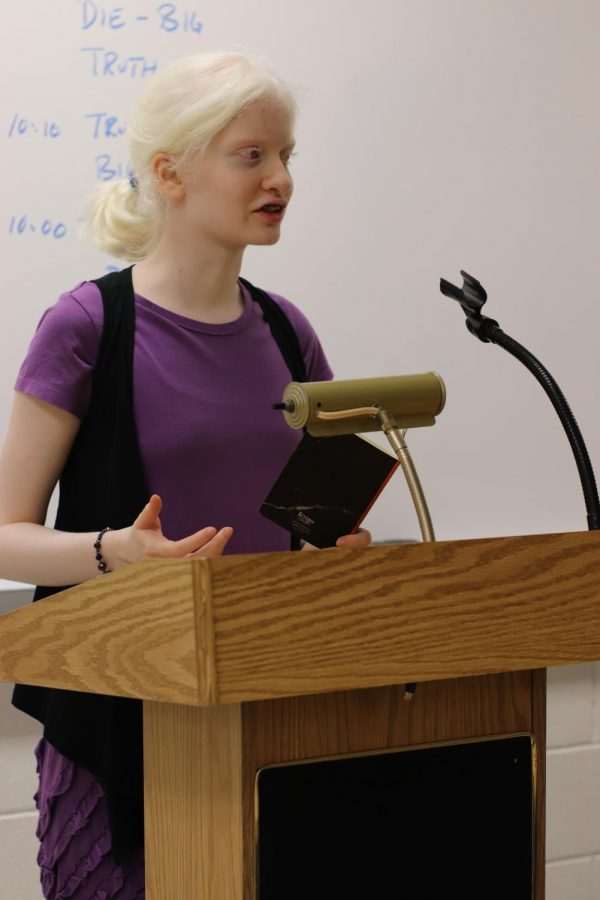The Art of Emotional Expression
Sophomore Esha Khator’s exploration of the intricacies of poetic language
Sophomore Esha Khator first started participating in Poetry Out Loud last year, using it as an outlet to express her passion for poetry’s complexities.
October 31, 2018
[Online version of an abbreviated In-Depth article printed in the October 2018 edition of tjTODAY]
“I am wearing dark glasses inside the house
To match my dark mood.
I have left all the sugar out of the pie.
My rage is a kind of domestic rage.”
The audience falls dead silent as Esha Khator, a freshman at the time, begins to recite lines from Suzanne Buffam’s “Enough” while gazing out toward the panel of Poetry Out Loud judges in front of her. Throughout the year, she will progress from the class round, hosted by her English teacher, Stephanie Glotfelty, to the school round, where she will compete with Jefferson’s top contestants from each grade. In fact, even a year later, as she prepares for her second time in the competition, Khator will still remember the poem as a stunningly poignant work of art, one that, among many others in the past, has continued to drive her passion for poetry.
Khator, now a sophomore, first began exploring her poetic nature at an early age, opting for the nuances of poetic language to rather than the direct conciseness of cut-and-dry papers.
“I’ve been interested in poetry since I first learned to write,” Khator said. “Instead of writing essays or stories when I was in second grade or first grade, I’d write poems because I found it so fun to rhyme. Eventually, I started reading more poems that didn’t rhyme or were more complex. They made me feel things, and I thought that was so cool that you could be so creative [through poetry].”
With myriad literary devices weaved into the stanzas of a poem, she found that creating such masterpieces allowed her to portray even the simplest of ideas in a more elegant and sophisticated manner.
“The same words you could use to write an essay could be used to make something so much more beautiful. I feel like [in poetry] you can use words to have multiple different definitions and different meanings and you get the point across in a prettier way than you can essays because one is more indirect. I feel the words seem different and they seem more interesting when you have to think about it.”
Oftentimes, Khator looks for poetic works that narrate a complex story, like ballads, or intensely emotional pieces that she can understand and empathize with. She believes that in doing so, she will be able to convey the same message and feelings as the author intended to do through the poem.
“I want the audience to comprehend the feelings and emotions that I’m feeling when I’m reciting the poem,” Khator said. “When I read poetry, my main goal is to feel exactly how the author felt writing it, and I hope I can convey that to the audience as well. When I recite a poem, I make eye contact, but in my head, I’m imagining myself in whatever scene the poem sets.”
To accomplish this successfully though, Khator puts in a considerable amount of effort towards perfecting her performance and recitation techniques.
“It’s a lot of practice and repetition,” Khator said. “The most important thing is to actually practice in front of other people. If you practice to yourself, yeah, you’ll memorize the words, but the biggest problem, [especially] for me, was choking up in front of other people.”
The budding poet also heavily uses visualization to facilitate her presentation of the poem’s meaning and act as another prevention measure against the possibility of freezing up in front of an audience.
“Getting started itself is kind of difficult because like you’re still seeing people in front of you, but as soon as you get into the poem, you can pretend to be the author or pretend to be someone else reciting the poem and then you’ll finish it [before you even know it’s over],” Khator said.
In addition to Poetry Out Loud, Khator plans to continue furthering her devotion towards poetry by going above and beyond and trying to apply the art to other activities. She believes that those who are brave enough to take the plunge into the world of poetry will receive valuable benefits in return.
“[In the future] I want to continue writing poetry maybe even illustrating some and submitting to Threshold,” Khator said. “Participating in Poetry Out Loud and reading poems has really improved my vocabulary and expression control, and I think other students should get into poetry writing because it’s a great way to express yourself using a lot less rules of writing.”






